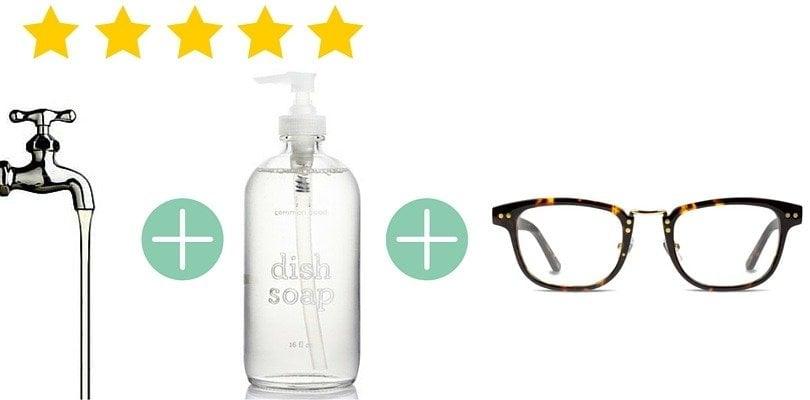
How to Clean Your Eyeglasses or Sunglasses – Vint & York
There is nothing worse than a distracting smudge stamped right in the middle of your eyeglasses lens. Or when your glasses always feel dirty. And it’s so tempting to grab the closest thing and start rubbing!
But stop. Trust us. We here at Vint & York have seen the horrific results of cleaning your eyeglasses with whatever happens to be around. While rubbing the smudge off your eyeglasses with a kitchen towel or shirt might get rid of the smudge for the moment, it will actually leave a much more distracting damage to the lenses in the long run — damage that can’t be erased.
Whether you’re only a beginner who started wearing eyeglasses just recently or have been wearing them your whole life, you may still find yourself wondering about the secrets of keeping clean and immaculate eyeglasses . Stick with this guide and you’ll learn how to properly clean your lenses and frames without any smudges, streaks or scratching!

The recommended steps to clean glasses:
Let’s get to work! Follow these steps to properly clean eyeglasses sunglasses:
- 1.To start, run your glasses under lukewarm water. Don’t use hot water, as it will decrease the lifespan on some lenses with coating. Extremely hot water may also distort the shape of some plastic frames.

- 2. Pick a simple kitchen dish soap. Put a small drop of dish soap on your fingertips. Gently rub on both sides of the lenses and the nose pads. If you’re looking for the best way to clean eyeglasses at home , dish soap is your answer. Even the American Optometric Association recommends it.
When using the dish soap method, citric-based detergent should not be used as it can damage the lenses. You should also avoid kitchen soap that also has lotion in it. Instead use a very simple, basic kitchen-sink soap without any fancy additives or abrasives.
An even more delicate way to clean your glasses with dish soap is to dunk your eyeglasses in a sink full of warm water that has a dollop of dish soap in it. Swish them around, rinse under warm water and get ready for everything to look much clearer!
- 3. Rinse with warm water, and gently dry he remaining water drops with a clean, microfiber cloth. Use light touches. The microfiber cloth leaves no fluff, so your glasses should be perfectly clean.
- 4. Inspect the frames and repeat steps until your lenses are spotless. If there are still smudges, dirt or oil that wasn’t properly cleaned off your glasses using dish soap, it’s time to repeat the steps. Put them under lukewarm water, add dish soap and gently massage them once again!
-
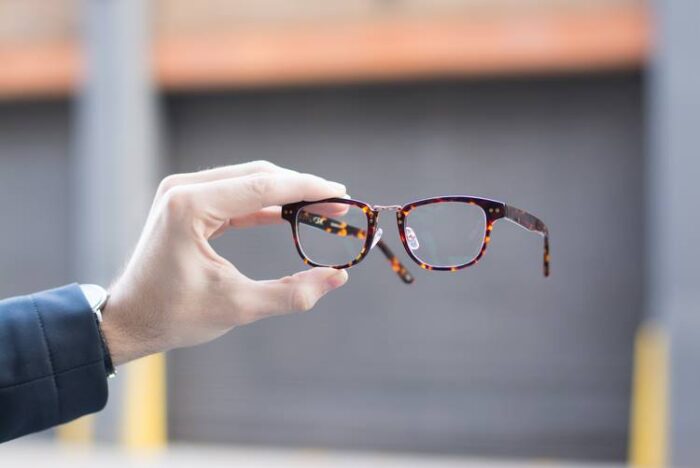
Vint & York Jordan Eyeglasses in Tortoise Shell – Get Yours here ! - 5. For small smudges on the glasses during the day, keep a microfiber cloth handy for dry touch-ups. Swipe only from arms to nosepiece. To remove oil and grease from eyeglasses, you have to swipe in the correct direction. Always start your eyeglasses swipe at the arms of the glasses (temple) and come towards the nosepieces. The eyeglass frame’s central brim and nose bridge (and nose pads, if any) should be kept for your last swipe.
-

Vint & York Fitzgerald Eyeglasses - There’s a reason you want to swipe you eyeglass lenses from arms to nosepiece. Much of the grease and oil that’s on your face will build up on the bridge of the frame and on the nosepieces. These eyeglass parts are known for harboring skin contact residue that tends to remain on the eyeglass cleaning cloth. If you start your swipe from the nose, you will smear all that oil and grease across the lenses, which will give you more cleaning work you’ll have to address if you want your glasses to be smudge-free.
- 6. Every so often, use jewelry polish safely on frames to refresh their look.
Only perform this step occasionally or you can end up doing more harm than good. An occasional dollop of jewelry polish on your frame will result in beautiful, clean and pristine eyeglass frames. If you polish plastic eyeglasses too often, the jewelry polish will eventually damage them. The same holds true for glasses frames that have a special finish. Polishing them too often can damage their special finish.
- 7. Keep them cleaner for longer : Don’t leave the frames on a sink or vanity.
- Leaving spectacles on a sink or vanity, where hairspray and perfume or powder can fly through the air, adds quickly to the residue. Avoiding this will keep your eyeglass frames cleaner for longer time.
-

The dish soap method is one of the best and safest ways to clean glasses. Dish soap works well for both metal and plastic acetate frames, but not on wood frames. Scroll below to find out what you can use on more special frames, like wood or vintage styles.
How to clean glasses with anti reflective coating or other special coatings?
Do your eyeglasses come with anti-reflective coating? Then this form of protective coating should never come into contact with ammonia, bleach, vinegar or window cleaner , which can break down the coating and strip them of the coating qualities.

Lenses with anti-reflective coating may require more frequent cleaning than other lenses. Just remember the trade-off for more frequent cleaning is an increased clarity of the lenses.

[cta text="Love vintage eyewear?" button_text="Browse our frames collections!" button_link="https://www.vintandyork.com/collection/"]Since all the Vint & York eyeglasses come with Anti-Reflective Coating, Anti-Scratch Coating, and UV Coating , we perfected the process of cleaning coated lenses .
What are the best & worst products to clean eyeglasses lenses?
It’s common for dust and grease to build up on your eyeglasses, and learning the safest ways to clean eyeglasses keeps your frames and lenses in top shape. Grabbing for any household product to clean your eyeglasses is not a good idea, even if the product is known for being nontoxic, effective or even extremely good for cleaning windows and mirrors.
Glasses are made out of different materials than most other household items, which means you need a different way of cleaning them. That doesn’t mean, however, some common cleaners won’t work.
Let’s gather some common eyeglass cleaning supplies and test their efficiency! So let’s see: What is the best solution to clean eyeglasses, besides dish soap, which is the most recommended product?
1. Alcohol
Many of those who look for how to make homemade eyeglasses cleaner turn to alcohol solutions. This is a natural move, as most eyeglasses cleaner solutions are made with alcohol. But you may still wonder, “Does alcohol clean eyeglasses?” or “Is it safe to clean eyeglasses with alcohol?”. The experts and Vint & York are on it, we’re giving you the answer right now.

When we talking about cleaning glasses with alcohol, we’re not referring to cleaning eyeglasses with vodka. We’re talking about combining, two common household ingredients that create a powerful and effective homemade eyeglass cleaner.
So, grab yourself a spray bottle of any size and use the following recipe:
- Fill your spray the bottle with ¾ full of rubbing alcohol.
Add two small drops of mild liquid dish soap, and fill the rest of the bottle with water.
Gently shake the mixture, being sure to not create any bubbles.
Now, just spray both sides of your lenses and gently rub them clean with a soft cotton cloth.
Rating: 3 stars.
2. Cleaning Tissues
An excellent recommendation to keep your eyeglasses clean throughout the day is to carry individually packaged lens wipes .
Although the wipes are damp in the packets, they tend to dry fairly quickly, so don’t waste any time. Immediately after opening the lens cleaning wipe package, swipe the wet wipe on your lenses on both sides, and then on the nose bridge and nose pads.
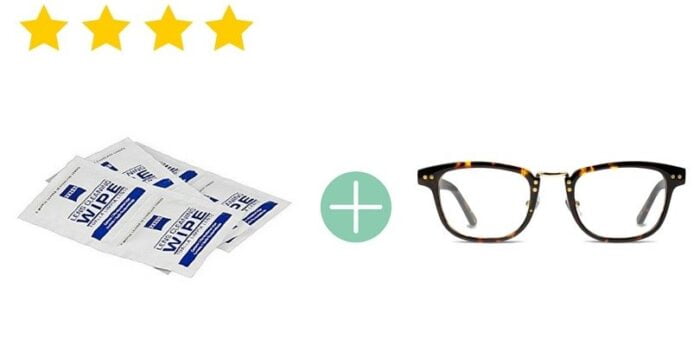
Once the wipe is dry, it becomes a cloth. Gently wipe it on your lens to remove any residue. Just be sure to wipe the nose bridge and nose pads last, as this is where most of the build up occurs. Swiping those areas before the lenses will only smear the residue all over the lenses.
Remember the best direction to swipe: from arms to nose bridge. The eyeglass frame’s central brim and nose bridge/nose pad should be kept for your last swipe, so you don’t spread the oils to the rest of the frame.
Cleaning tissues are one of the best spectacle cleaner .
Rating: 4 stars!
3. Vinegar, Window Cleaner, and Toothpaste
Vinegar may be great for many household cleaning chores, while window cleaner and toothpaste can also work to clean a number of items. But none do well with eyeglasses.
Just because vinegar is an excellent, nontoxic cleaning agent for many things doesn’t mean it’s suitable for glasses. Vinegar can actually be very damaging to your lenses.
Window cleaners, like Windex and Lysol, are another solution you don’t want to use on eyeglasses. You also want to avoid cleaning your eyeglass lenses with ammonia or other household cleaners that contain strong chemicals. Those chemicals are not only strong enough to remove dirt from your home, but they’re also strong enough to eventually break down and destroy any type of anti-reflective coating on your eyeglass lenses.

Using lemon juice to clean eyeglasses is another no-no. Just like the chemicals in cleaning agents, the acids in lemon juice can strip away the coatings on your eyeglasses.
What about toothpaste? Can toothpaste be used to clean glasses? In short, no. While some sources say that you can remove scratches from eyeglasses with toothpaste , it still isn’t a recommended solution. The ingredients in toothpaste can do more harm than good for your eyeglasses. Nor do the ingredients work as an anti-scratch spray for glasses .
When you’re looking for a home remedy for cleaning eyeglasses, it’s best to stick with dish soap and water.
If you’re looking for a more frugal version of any eyeglass cleaner, try dish washer soap and water — but never vinegar, window cleaner or toothpaste.
Rating: NEVER!
4. Your shirt, or without any liquid
We’ve all done it. The biggest crime in lens care: exhaling onto the lenses, then wiping the fog off with part of our shirt.

You probably even know that’s the wrong way to clean glasses, but you do it anyway. When a massive smudge is interrupting your view, it’s simply too tempting to get rid of it anyway you can as quickly as possible.
A quick fix for cleaning a smudge off your lenses is certainly wiping it off with your shirt, or the nearest tissue, paper towel or napkin. But going for this quick fix for the short term will cause significant long-term damage to your lenses because your shirt contains dust and other particles that can easily scratch your glasses.
Using your breath or spit is another tempting quick fix for dirty lenses, but the method is ineffective and certainly not hygienic.
NEVER clean your glasses without using liquid , even with a microfiber cloth. Particles of dust end up pressed into the eyeglass lenses from the cloth. As you move the cloth around your lenses, your lenses will inevitably become scratched. So always use some sort of liquid, whether it is mild soap and water or a store purchased cleaner.
Now, if you’re looking to keep your glasses clean throughout the day, try to get into the habit of washing them each morning as part of your daily routine. This involves cleaning the frames, lenses, and earpieces. Not only will you start the day with clear, clean eyeglasses, but you’ll also be less tempted to use one of the quick yet damaging cleaning fixes throughout the day.
Rating: NEVER!
5. Microfiber Cloths
As you already learned from this guide, safely clean eyeglasses without streaks and scratching involve some type of liquid. It bears repeated: never clean your eyeglasses without liquid .
When using liquid, you’re also going to want to use a microfiber cloth.
A microfiber cloth is actually considered the best thing to clean eyeglasses . That’s because they’re typically made from a combination of nylon and polyester, which almost guarantees not to cause scratching on your eyeglass lenses.
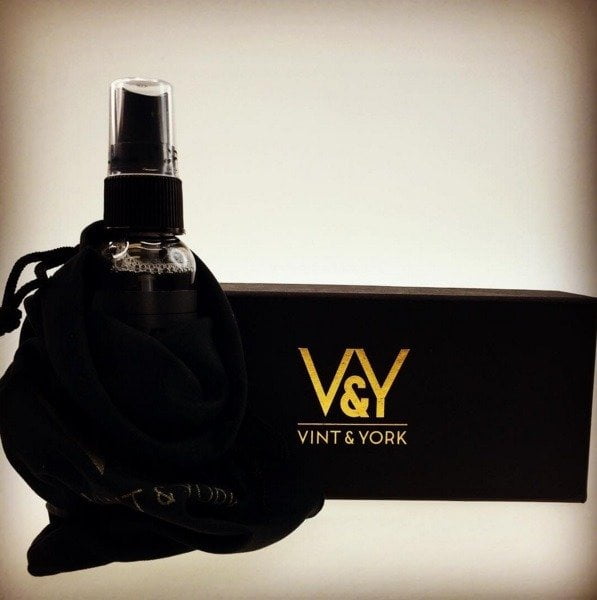
Microfiber cloths are so effective that they aren’t only the best fabric to clean eyeglasses, but are also considered to be the best material to clean anything that is prone to scratches.
However, dust and debris can still get caught in the fabric, so it is vital to keep them clean. When you use microfiber cloths on your glasses, do it so very gently. To keep microfiber cloths clean, simply hand wash eyeglasses cloths once a week, letting them hang to dry.
Special microfiber cloths are good for dry touch-ups during the day, but they aren’t a substitute for a thorough, soapy cleaning. Neither is your breath.
Do not use a cloth to buff a dry lens that’s just asking for scratches. Make it easy to give your glasses a quick, safe cleaning by keeping eyeglass cleaner and microfiber cloths at home, in the car, and at work.
Never use a tissue, paper towel or toilet paper to clean your eyeglasses . All of these products are paper-based, which means they’re typically wood-pulp based. Anything with a wood pulp base is not a good choice for wiping your glasses. Use cotton-based materials only.
6. Deep Clean Machine
Do you feel like your glasses have been through a lot and need a deep clean?
You can invest in an eyeglass cleaning machine for some periodic deep cleaning. This maintenance step is crucial to contribute to eyeglass longevity and clarity.
A machine to clean your eyeglasses can cost as little as $20, which makes it entirely economical to engage in this important step. With any eyeglass cleaning machines, always use clean lukewarm water even if the directions call for hot water. The High-temperature water can actually warp your frames and lens coating. Although you can use, tap water in your glasses cleaning machine filtered water is recommended.
Each machine comes with its own set of instructions, and the deep-cleaning process typically takes about 10 minutes. For an even deeper clean, you may also want to have your optician remove your lenses. That way the edges and frame groves can be cleaned thoroughly.
Rating: 5 stars!
Steps to clean small, inaccessible parts of glasses
Over time, your glasses may experience a buildup of oil and dirt, which can sometimes cause a film on your eyeglasses. While cleaning the small and inaccessible parts of the glasses may seem like a tedious task at first, it is actually fairly simple.

- 1. Use a soft bristle toothbrush
- When learning how to clean these small parts, including the nose pads of glasses , just grab a soft-bristled toothbrush and lightly brush them. Don’t brush the lenses as it may cause scratches.

Maintenance is also a crucial component of promoting longevity of your eyeglasses that should not be skipped.
- 2. Remove screws for metal frames
If you have metal-rimmed eyeglasses, you can remove the screws, tab them with Loctite (can be found in hardware or auto stores) and then put the screw back in. Doing so will keep your frames tighter.
As for those nose pads, they are replaceable if need be.
How to clean special frames?
When learning how to clean glasses parts properly, it’s crucial that you first consider what your frames are made of. Plastic and metal are the most common frames, but we also go over vintage and hipster frames in this guide.
Once you’ve determined the material used in your frames, you can proceed with the following cleaning methods. However, if you’re still unsure of the material used, a soft cloth and warm water is generally the safest route for cleaning your frames.

1. Plastic Acetate Frames
Most modern frames are made of high-quality celluloid acetate in gloss or matte finish, which is what you’ll find with Vint & York. Of the 69 million Americans who bought prescription spectacles last year, most purchased plastic lenses. Glass has gone out of fashion, mainly due to safety concerns.

- 1. Cleaning plastic eyeglasses lenses is fairly easy. You may have standard plastic lenses, which tend to be more scratch-resistant than polycarbonate lenses, as it’s a harder material. Keep in mind that plastic is soft and can scratch easily. Once lenses are scraped up, there is no way to buff that scratch out.
- 2. You can also clean haze off plastic eyeglasses lenses fairly easily. First, the trick to keeping that film from occurring is to prevent it from setting in. Regular washing of your eyeglasses can take care of that. To remove the haze, use a mild hand or dish soap and lightly brush the frames with a soft toothbrush, being sure to not rub on the actual lenses.
Maybe you still have questions, such as How do you clean tortoise shell glasses ? Never use anything with ammonia or acid to clean tortoise shell lenses, as these substances can actually destroy that beloved vintage pattern.
2. Metal frames
Metal eyeglasses frames are highly popular since they are lightweight and can feature a unique, beautiful antiqued finish.
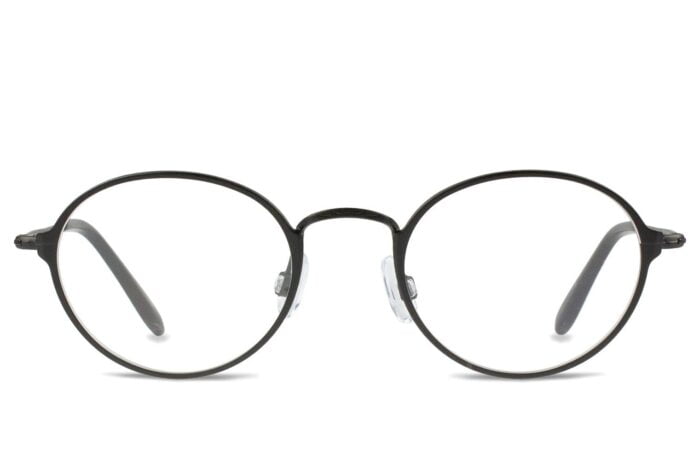
Grimy, slippery and dirty metal frames can be really annoying to wear, and cleaning them is actually easy. You can use a jewelry polish or allow your frames to sit in lukewarm water with dish soap overnight. Doing so will break down the buildup of oil and grease better than other cleaning methods.
Then in the morning, just rinse them with warm water and dry them with a clean, soft cloth.
3. Wood frames
Wood is somewhat harder to maintain and can be easily damaged if not stored properly. If you are not wearing them, keep them in a hard case or safe place.


Care for your wood glasses the same way you would care for a nice piece of wood furniture. Apply a coat of oil or wax to bring the luster back.
If you’re just after the wooden look and don’t want to overcomplicate your life with maintaining wooden glasses, try the “faux” wooden eyeglasses – they look like wood but give you the durability and ease of acetate.

4. Vintage Frames
Authentically vintage frames are going to several years — or decades — old. Make sure you examine your vintage frames to spot any imperfections or damage, as this can change the methods used to clean them.

Some vintage fashion glasses have special details that need extra attention, just like little pieces of jewelry. Typically, jewelry polish or lukewarm water with mild dish soap can be used safely on them. However, if you polish plastic eyeglasses too often they will eventually damage them.
If you’re crazy about the vintage look but don’t want to risk buying real vintage glasses that might need refurbishing, check out this Vint & York selection of vintage-inspired eyeglasses .

5. Hipster Glasses
If you’re trying to figure out how to clean hipster glasses , the only thing you should keep in mind is to not polish them too often. Doing so can damage the special finish.

Generally, lukewarm water and mild dish soap can also be used to clean hipster frames. The soap and water method typically works for hipster frames of all types, from wood to antique finish with anything in between.
If you’re still wondering how to clean nonprescription glasses, you need not wonder any longer. The same steps used to clean prescription eyeglasses and sunglasses can be used to clean nonprescription glasses as well.

How to keep eyeglasses cleaner for a longer time
Many eyeglass wearers wonder how to keep the lenses clean , or how to stop glasses from smudging. You’ll be happy to know that keeping your eyewear clean for longer periods of time is super easy with some little tips and tricks.
Here are the steps to keep glasses clean for longer periods of time:
- 1. Watch where you lace them. Keeping your glasses cleaner can be as simple as never resting your glasses on the sink or any surface where you use hair products and cosmetics. This is because the buildup can be transferred onto your glasses.
- 2. When looking to keep eyeglasses clean longer, you also want to be sure to never put your glasses down on their lenses.
- 3. Try to always place them back in their case when you aren’t using them. At the very least, place them on their frames instead of lenses. This will help protect your lenses from smudges and scratches.
- 4. Persistent smearing in the center of your lenses? It might be your lashes or mascara. You may experience persistent smudging in the center of your lenses, despite your incredible efforts to keep them clean. This is a common problem for many women as well as men with long, thick eyelashes.
If you have naturally long lashes, nose pads or a thin adhesive pad under the nose bridge can help deter the smudging from happening. This prevents lashes and their natural oils from touching the lenses.
If the smudging occurs from your makeup, try curling your eyelashes at the base and the ends once you have applied mascara. This will change the angle of your lashes so they’re not brushing up against your lenses.
- Dish soap, warm water, and a dry cloth are the eyeglasses cleaning supplies you need, once a day, to keep glasses optimally clean and functional.
- Natural oils from your hands, eyelashes and face can lead to a lot of buildups each day, reducing lenses’ effectiveness.
- Leaving spectacles on a sink or vanity, where hairspray and perfume can fly through the air, adds to the residue.

Voila! Everything looks brighter and clearer now!
Your eyeglasses are an investment, so making them last longer with proper care should be one of your ongoing priorities.
If you’re looking for a new pair of glasses to add to your collection, check out the high-quality designer frames at Vint & York.
[cta text="Want more eyewear styles?" button_text="Browse our frames collections!" button_link="https://www.vintandyork.com/collection/"]










Leave a comment
This site is protected by hCaptcha and the hCaptcha Privacy Policy and Terms of Service apply.